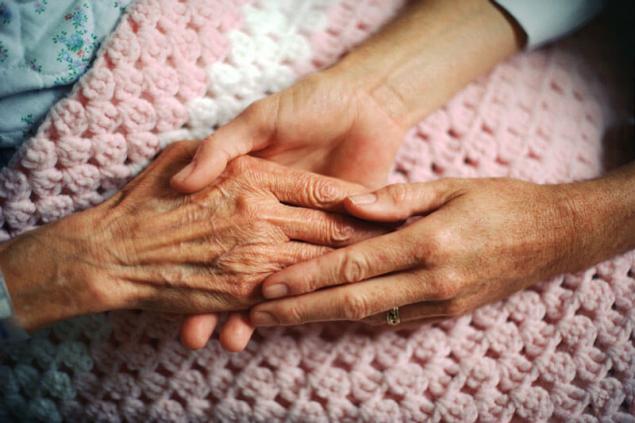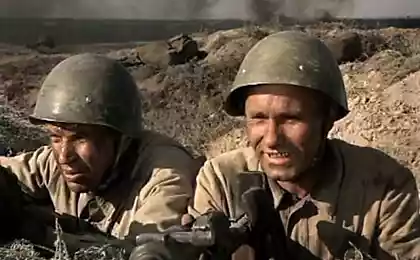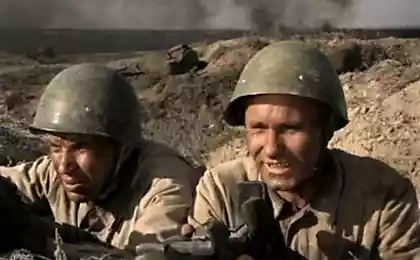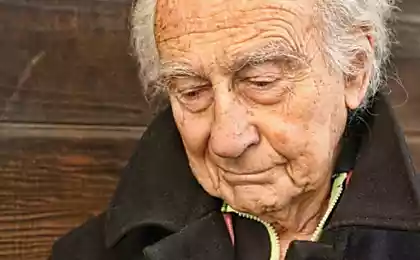500
The heaviness or lightness of death: is there a criterion
Probably everyone who for a long time, services are often faced with the dying, being his witness and the witness comes up with the idea, is there a criterion by which to judge the heaviness or lightness of death. Is there a criterion for evaluation of the work that we put into a dying patient?.. Any death can be called "good" and to put a "good" rating?
First of all, it should be noted that death is as individual as the life. Although our first priority is to relieve pain, we understand that this is not the only thing you can do for the patient.
Of course, "good", the death that occurs in the stage of acceptance of death, in the so-called stage of reconciliation. Indeed, the more the patient fights for his life, the harder it is to die for and the more you struggle, the harder the death.
It is also known that the patient requires to obtain the so-called psychological permission to die.

We know that the patient must be "ripe" for adoption of death and permit themselves to die.Probably time the patient is defined by him and the staff only guesses at this time. Often, patients do not go alone but in groups. Often we are confronted with the phenomenon when the roommates are asked not to isolate them from dying patient and even put the screen. This is probably cruel curiosity of others ' dying is kind of fitting someone else's death on himself. Of course, this is not a rule and we met the patients, who preferred the so-called lonely death, ashamed of what their experience will be in full view of others.
The proximity of death often raises the question of the need to inform patient on her ward. However, in our opinion, patients receive information about their condition and in many cases hide it from others. A memorable example of a girl with leukemia, she painted, and her drawings were in black, dark colors. One day she painted a bright picture of a sun, blue sky, flowers. The doctor happily told the girl's mother, that will obviously be in remission since her daughter's change in mentality. The next day the girl died. The mother admitted that she did not want to upset the doctor. Her daughter explained the drawing: "the Sun shines in the Kingdom of heaven." These moments of relief before her death, the latest hi life, happens Quite often.
The patient must obtain "permission" from their families and loved ones. It is quite a difficult task, because the contact is not on the verbal level, and transsituational. Relatives, seemingly already resigned to the idea loss, suddenly, at the last moment, unable to prevent what is happening and try to hold her close. We have often witnessed family sitting at the bedside of the patient, prolonged his agony. In this case, we asked them to leave the patient for some time. Even this very short period of separation was enough that the patient died.
Resolution on the death of the patient must also obtain from the physician and the nurses, who is next to him. Again, the patient was not told that he was dying, but he needed the last touch, holding hands, sometimes praying (even to myself, not out loud) allowed him to feel it farewell permission to take his departure.
Often, patients should get permission from the priest. The adoption of the Holy sacrament (extreme unction), baptism is sometimes at the last moment allow a patient to receive forgiveness for mistakes in life and allowing her to leave. Finally, most importantly, the patient needs to get permission to kill himself. We could cite many examples where patients have died, taking such a decision, while their General condition was on the brink and leave plenty of time for life.
A memorable patient who maintained optimism until the last moment. But with him, to make matters worse, paralyzed legs. "Well, if I can't get up, I don't want more and live", — he summed up his life. And in the evening died.
In the dying is extremely important that the concept of a pure conscience. That's when the parting becomes synonymous with forgiveness. Unpaid debts, neocumingii sins, Unforgiven resentments interfere with quiet care. Past returns and, becoming real, is not allowed to attack the future. Sometimes long and painful agony, full of psychotic experiences, embodies this struggle for the "not so past" life.
All phases, again and again, alternating flow in consciousness from displacement to depression, while the phase of reconciliation and harmony with fate does not allow fighting and puts an end. Of course, all of the above schema only. Standards in life and in death, not if one becomes free. And he really is up for grabs... Take as example fear. All my life we hold with fear. Fear of parents disapproval of society, loss of work, social status, fear of not being loved, etc. ultimately all manifestations of the fear of death. But when she is already behind, when it is already inevitable, the fear disappears along with the hope for salvation. And to the surprise of many is an intoxicating sense of freedom. Freedom from fear can be comparable only with freedom from suffering, freedom from the worn out body. Then the human spirit is spreading its wings.
As you can see, the stage of acceptance of death, organically incorporating the so-called authorization for care may indicate a sufficient quality of care of the patient.
For a peaceful death for the patient in no less need feeling a sense of duty towards loved ones, when he bade farewell to relatives, spoke to relatives, wrote the will. It should be noted that the concept of the will goes beyond the simple instructions of inheritance. The behavior itself dying can be a kind of a Testament, as is the example model for the family. The courage to overcome themselves and to give at least a smile or Hello loved ones, or weakness, and the desperate clinging to life are recorded and repeated in turn by those who shared the last minutes of the outgoing. There is no mystery, and that children often repeat the story of their parents ' lives. Returning to the problem of the will, we mention another sense it is false shame that is present in the relations of family and outgoing. Yes, we agree that the conversation about the will carries the news of possible imminent death, but, when faced with the consequences of this default, the preservation of decency, wish to access the reverse side of the coin. Here is one of many examples. Two elderly couple fell out, by some trifle, and divorced. A month passed, and, forgetting wrongs, they were reunited. To go to the registry office and register again they hesitate, deciding what will live and so. Soon the wife gets cancer and gets the hospice. The husband protects the wife from a heavy foreboding. Tips to speak on the subject of the will and death are rejected. Finally, the woman dies. The husband, having returned home, can not enter the flat as quick officials, knowing that he was discharged from the area of his wife, have it sealed. On account of the deceased — a large amount of money, but it was clean "state." The husband has no money to bury my wife, and she is sent to the anatomical theatre as "unclaimed". In light of this and similar cases I would like to revisit the issue of "modesty", is not so long ago promoted as an example of "decent" behavior.
The time of positivity of a will can be illustrated by another example. A young woman of 40 years old fell ill with breast cancer and was in hospice. The family was forbidden to tell her the truth and she found out the truth about his position only the day before death. She was a 15-year-old son from his first marriage, and worrying about his fate, she began feverishly to write him a letter. "My dear son, forgive me, I'm dying. I never thought that you will not be able to grow up independent of age, but you should know that I always loved you and been proud of you, proud that you do not smoke, do not swear that you have a good heart. I want to believe that you were always so..." she did not have time to finish, but received a son, it was his true will, the guiding light in his life.
Thus, the last words of the dying are extremely important for living and the process of farewell becomes a profound spiritual meaning for those, and for others.
It is interesting to note that often the wills of the dying are the positions of the continuation of life. Of course, the transformed, but that's life. Bearing in mind that wishes are realized intimate setting of people, it is impossible not to be surprised by their latest orders. The drama is a success or a failed fate is invested in a will: "do Not bury me in the cemetery. Burn and bury the urn under the birch tree in my garden".
An elderly woman before her death, invited all his friends and acquaintances. Everyone gave them gifts and asked to remember about yourself. Son left the disposal of the urn with the ashes thrown into the sea at the bottom of the Bay Koktebel in the Crimea, which was her favorite place. And of course, the desire to be buried next to his parents in tune with the attitudes that keep us in moments of pain call my mother. The earth itself takes on a special meaning as the native, if it is buried by our ancestors. Reason immigrants are willing to pay a lot of money to be buried in his Homeland. People in his will trying to arrange your death situation, and it makes it easier and brightened his last moments.
When we try to assess the severity of death, talking about relatively easy and so-called good death, we cannot call a fairly reliable criterion of our work is the smile. At the time of death of our patients are not "left to itself", they can focus not on yourself but on others... and not been harsh to him. They smiled. The smile in the last moment of life is the gift of gratitude to the honoured few.
Now you should describe the heavy death. Lie about the diagnosis and prognosis is, what aggravates dying. Since ancient times in books about death, it was stressed that the patient should withdraw from the world in clear consciousness and understanding of what was happening to him.
The second point that makes dying difficult, and painful agony, is waiting for relatives who do not come. The third is the presence of pain we can't shoot. It should be noted that at the time of dying, the psychological pain often prevails over the physical, which is weakened by toxicity and the General exhaustion of the body.
A desperate struggle for life in a patient who is not "reconciled" or has no information about the death, also aggravates his care.
Approximately 40-50% of cases, patients have so-called near-death anguish. It is not copied drugs, it is not the equivalent of pain. It cannot be identified with the depression in it, the farewell and the sadness of parting, in her summary and evaluation of life.
Another point aggravating death, is loneliness. At the time of death sometimes a person is trying to make an assessment of not only himself, but also her relationships, and, at times, drives himself from so-called loved ones, realizing that it is wrong for him. Relatives left who are able to share his last meal. And these are often employees of the hospice.
It is important to give a dying man to feel that he is not alone. Here I would like to give an example of service to the patient is known from the book of the priest and physician: "In the beginning of the war I was surgeon in the field hospital and in my ward was dying young soldier. I, of course, visited in the afternoon; and then evening came and looked at it, and it became clear to me that he is not a tenant. I asked him: "Well, how are you feeling?" He looked at me deeply, quietly (he was a farmer, so it was so quiet fields, the quiet woods, the quiet unhurried life), and I said, "tonight I will die." I said, "Yes, today you die. Are you scared?" — "To die I'm not afraid, but I am so bummed that I will die completely alone. Would die I'm home — when I was a wife and mother, and children, and neighbors, and there's nobody here..." I said, "No, I'll stay with you". "You can't sit with me whole night". — "Excellent!" He thought, he said, "you Know, even if you sit down here as we speak, I'm aware of your presence, and at some point I'll lose you and leave this horrible loneliness at a time when it is more painful to die." I said, "No, not so. I'm with you there sit. First, we'll talk, I'll tell you about my village; give me the address of his wife. I'll write to her when you die; if you happen to visit after the war. And then you start to weaken, and you will be already impossible to say, but you will be able to look at me. By the time I hand take. First you'll open your eyes and see me, then close your eyes and to see me can not, will not have the strength to open them, but you're going to feel my hand in your hand or your hand in mine. Gradually, you will be removed, and I'm going to feel, and occasionally go to shake your hand, want you to feel that I'm not gone, I'm here. At some point, you're in my shaking hands I can not answer because you won't be here. Your hand releases me, I'll know you died. But you know until the last minute was not one." And so it happened." (Metropolitan Anthony Suwalski. Life. Bolezn. Death. Wedge, 2001. P. 27-28.)
I would like to mention another observation which is enshrined in traditional Proverbs and sayings, such as: "I would be in heaven, but sin is not allowed", "bad conscience is something that cannot be corrected and what cannot be rid of," "a Quiet conscience gives a peaceful death," etc.
Relying on popular wisdom, will inevitably come to the conclusion about the most important need of the dying to confess. Psychotherapeutic support in the person of the priest is the the best chance which gives the opportunity to die easy (easier).
Want to bitterly complain about our lost traditions — lamentations, songs, prayers, bell ringing, which mitigated the severity of the last minutes of a dying man. As was the healing and for his family. Connection with nature, identification with her allowed to transfer their ideas about death and memory of the deceased at the surroundings. Suffice it to recall the people's lamentations, where, for example, says: "spring water is my blood, the steep Bank is my chest, white stones is my eyes". Do not these people's beliefs is the beginning of the tradition to put on the grave of flowers and trees?.. published
From the book Gnezdilova A. V. "Psychology and psychotherapy losses"
P. S. And remember, just changing your mind - together we change the world! ©
Source: www.ustinova.info/problema-umiraniya/
First of all, it should be noted that death is as individual as the life. Although our first priority is to relieve pain, we understand that this is not the only thing you can do for the patient.
Of course, "good", the death that occurs in the stage of acceptance of death, in the so-called stage of reconciliation. Indeed, the more the patient fights for his life, the harder it is to die for and the more you struggle, the harder the death.
It is also known that the patient requires to obtain the so-called psychological permission to die.

We know that the patient must be "ripe" for adoption of death and permit themselves to die.Probably time the patient is defined by him and the staff only guesses at this time. Often, patients do not go alone but in groups. Often we are confronted with the phenomenon when the roommates are asked not to isolate them from dying patient and even put the screen. This is probably cruel curiosity of others ' dying is kind of fitting someone else's death on himself. Of course, this is not a rule and we met the patients, who preferred the so-called lonely death, ashamed of what their experience will be in full view of others.
The proximity of death often raises the question of the need to inform patient on her ward. However, in our opinion, patients receive information about their condition and in many cases hide it from others. A memorable example of a girl with leukemia, she painted, and her drawings were in black, dark colors. One day she painted a bright picture of a sun, blue sky, flowers. The doctor happily told the girl's mother, that will obviously be in remission since her daughter's change in mentality. The next day the girl died. The mother admitted that she did not want to upset the doctor. Her daughter explained the drawing: "the Sun shines in the Kingdom of heaven." These moments of relief before her death, the latest hi life, happens Quite often.
The patient must obtain "permission" from their families and loved ones. It is quite a difficult task, because the contact is not on the verbal level, and transsituational. Relatives, seemingly already resigned to the idea loss, suddenly, at the last moment, unable to prevent what is happening and try to hold her close. We have often witnessed family sitting at the bedside of the patient, prolonged his agony. In this case, we asked them to leave the patient for some time. Even this very short period of separation was enough that the patient died.
Resolution on the death of the patient must also obtain from the physician and the nurses, who is next to him. Again, the patient was not told that he was dying, but he needed the last touch, holding hands, sometimes praying (even to myself, not out loud) allowed him to feel it farewell permission to take his departure.
Often, patients should get permission from the priest. The adoption of the Holy sacrament (extreme unction), baptism is sometimes at the last moment allow a patient to receive forgiveness for mistakes in life and allowing her to leave. Finally, most importantly, the patient needs to get permission to kill himself. We could cite many examples where patients have died, taking such a decision, while their General condition was on the brink and leave plenty of time for life.
A memorable patient who maintained optimism until the last moment. But with him, to make matters worse, paralyzed legs. "Well, if I can't get up, I don't want more and live", — he summed up his life. And in the evening died.
In the dying is extremely important that the concept of a pure conscience. That's when the parting becomes synonymous with forgiveness. Unpaid debts, neocumingii sins, Unforgiven resentments interfere with quiet care. Past returns and, becoming real, is not allowed to attack the future. Sometimes long and painful agony, full of psychotic experiences, embodies this struggle for the "not so past" life.
All phases, again and again, alternating flow in consciousness from displacement to depression, while the phase of reconciliation and harmony with fate does not allow fighting and puts an end. Of course, all of the above schema only. Standards in life and in death, not if one becomes free. And he really is up for grabs... Take as example fear. All my life we hold with fear. Fear of parents disapproval of society, loss of work, social status, fear of not being loved, etc. ultimately all manifestations of the fear of death. But when she is already behind, when it is already inevitable, the fear disappears along with the hope for salvation. And to the surprise of many is an intoxicating sense of freedom. Freedom from fear can be comparable only with freedom from suffering, freedom from the worn out body. Then the human spirit is spreading its wings.
As you can see, the stage of acceptance of death, organically incorporating the so-called authorization for care may indicate a sufficient quality of care of the patient.
For a peaceful death for the patient in no less need feeling a sense of duty towards loved ones, when he bade farewell to relatives, spoke to relatives, wrote the will. It should be noted that the concept of the will goes beyond the simple instructions of inheritance. The behavior itself dying can be a kind of a Testament, as is the example model for the family. The courage to overcome themselves and to give at least a smile or Hello loved ones, or weakness, and the desperate clinging to life are recorded and repeated in turn by those who shared the last minutes of the outgoing. There is no mystery, and that children often repeat the story of their parents ' lives. Returning to the problem of the will, we mention another sense it is false shame that is present in the relations of family and outgoing. Yes, we agree that the conversation about the will carries the news of possible imminent death, but, when faced with the consequences of this default, the preservation of decency, wish to access the reverse side of the coin. Here is one of many examples. Two elderly couple fell out, by some trifle, and divorced. A month passed, and, forgetting wrongs, they were reunited. To go to the registry office and register again they hesitate, deciding what will live and so. Soon the wife gets cancer and gets the hospice. The husband protects the wife from a heavy foreboding. Tips to speak on the subject of the will and death are rejected. Finally, the woman dies. The husband, having returned home, can not enter the flat as quick officials, knowing that he was discharged from the area of his wife, have it sealed. On account of the deceased — a large amount of money, but it was clean "state." The husband has no money to bury my wife, and she is sent to the anatomical theatre as "unclaimed". In light of this and similar cases I would like to revisit the issue of "modesty", is not so long ago promoted as an example of "decent" behavior.
The time of positivity of a will can be illustrated by another example. A young woman of 40 years old fell ill with breast cancer and was in hospice. The family was forbidden to tell her the truth and she found out the truth about his position only the day before death. She was a 15-year-old son from his first marriage, and worrying about his fate, she began feverishly to write him a letter. "My dear son, forgive me, I'm dying. I never thought that you will not be able to grow up independent of age, but you should know that I always loved you and been proud of you, proud that you do not smoke, do not swear that you have a good heart. I want to believe that you were always so..." she did not have time to finish, but received a son, it was his true will, the guiding light in his life.
Thus, the last words of the dying are extremely important for living and the process of farewell becomes a profound spiritual meaning for those, and for others.
It is interesting to note that often the wills of the dying are the positions of the continuation of life. Of course, the transformed, but that's life. Bearing in mind that wishes are realized intimate setting of people, it is impossible not to be surprised by their latest orders. The drama is a success or a failed fate is invested in a will: "do Not bury me in the cemetery. Burn and bury the urn under the birch tree in my garden".
An elderly woman before her death, invited all his friends and acquaintances. Everyone gave them gifts and asked to remember about yourself. Son left the disposal of the urn with the ashes thrown into the sea at the bottom of the Bay Koktebel in the Crimea, which was her favorite place. And of course, the desire to be buried next to his parents in tune with the attitudes that keep us in moments of pain call my mother. The earth itself takes on a special meaning as the native, if it is buried by our ancestors. Reason immigrants are willing to pay a lot of money to be buried in his Homeland. People in his will trying to arrange your death situation, and it makes it easier and brightened his last moments.
When we try to assess the severity of death, talking about relatively easy and so-called good death, we cannot call a fairly reliable criterion of our work is the smile. At the time of death of our patients are not "left to itself", they can focus not on yourself but on others... and not been harsh to him. They smiled. The smile in the last moment of life is the gift of gratitude to the honoured few.
Now you should describe the heavy death. Lie about the diagnosis and prognosis is, what aggravates dying. Since ancient times in books about death, it was stressed that the patient should withdraw from the world in clear consciousness and understanding of what was happening to him.
The second point that makes dying difficult, and painful agony, is waiting for relatives who do not come. The third is the presence of pain we can't shoot. It should be noted that at the time of dying, the psychological pain often prevails over the physical, which is weakened by toxicity and the General exhaustion of the body.
A desperate struggle for life in a patient who is not "reconciled" or has no information about the death, also aggravates his care.
Approximately 40-50% of cases, patients have so-called near-death anguish. It is not copied drugs, it is not the equivalent of pain. It cannot be identified with the depression in it, the farewell and the sadness of parting, in her summary and evaluation of life.
Another point aggravating death, is loneliness. At the time of death sometimes a person is trying to make an assessment of not only himself, but also her relationships, and, at times, drives himself from so-called loved ones, realizing that it is wrong for him. Relatives left who are able to share his last meal. And these are often employees of the hospice.
It is important to give a dying man to feel that he is not alone. Here I would like to give an example of service to the patient is known from the book of the priest and physician: "In the beginning of the war I was surgeon in the field hospital and in my ward was dying young soldier. I, of course, visited in the afternoon; and then evening came and looked at it, and it became clear to me that he is not a tenant. I asked him: "Well, how are you feeling?" He looked at me deeply, quietly (he was a farmer, so it was so quiet fields, the quiet woods, the quiet unhurried life), and I said, "tonight I will die." I said, "Yes, today you die. Are you scared?" — "To die I'm not afraid, but I am so bummed that I will die completely alone. Would die I'm home — when I was a wife and mother, and children, and neighbors, and there's nobody here..." I said, "No, I'll stay with you". "You can't sit with me whole night". — "Excellent!" He thought, he said, "you Know, even if you sit down here as we speak, I'm aware of your presence, and at some point I'll lose you and leave this horrible loneliness at a time when it is more painful to die." I said, "No, not so. I'm with you there sit. First, we'll talk, I'll tell you about my village; give me the address of his wife. I'll write to her when you die; if you happen to visit after the war. And then you start to weaken, and you will be already impossible to say, but you will be able to look at me. By the time I hand take. First you'll open your eyes and see me, then close your eyes and to see me can not, will not have the strength to open them, but you're going to feel my hand in your hand or your hand in mine. Gradually, you will be removed, and I'm going to feel, and occasionally go to shake your hand, want you to feel that I'm not gone, I'm here. At some point, you're in my shaking hands I can not answer because you won't be here. Your hand releases me, I'll know you died. But you know until the last minute was not one." And so it happened." (Metropolitan Anthony Suwalski. Life. Bolezn. Death. Wedge, 2001. P. 27-28.)
I would like to mention another observation which is enshrined in traditional Proverbs and sayings, such as: "I would be in heaven, but sin is not allowed", "bad conscience is something that cannot be corrected and what cannot be rid of," "a Quiet conscience gives a peaceful death," etc.
Relying on popular wisdom, will inevitably come to the conclusion about the most important need of the dying to confess. Psychotherapeutic support in the person of the priest is the the best chance which gives the opportunity to die easy (easier).
Want to bitterly complain about our lost traditions — lamentations, songs, prayers, bell ringing, which mitigated the severity of the last minutes of a dying man. As was the healing and for his family. Connection with nature, identification with her allowed to transfer their ideas about death and memory of the deceased at the surroundings. Suffice it to recall the people's lamentations, where, for example, says: "spring water is my blood, the steep Bank is my chest, white stones is my eyes". Do not these people's beliefs is the beginning of the tradition to put on the grave of flowers and trees?.. published
From the book Gnezdilova A. V. "Psychology and psychotherapy losses"
P. S. And remember, just changing your mind - together we change the world! ©
Source: www.ustinova.info/problema-umiraniya/























